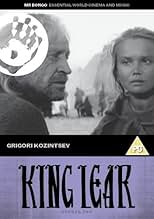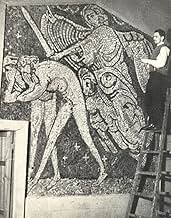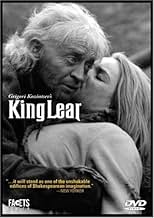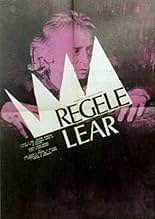IMDb-BEWERTUNG
8,0/10
1765
IHRE BEWERTUNG
Füge eine Handlung in deiner Sprache hinzuA Soviet adaptation of a world-famous tragedy about an aged king and how cruelly he lose his illusions.A Soviet adaptation of a world-famous tragedy about an aged king and how cruelly he lose his illusions.A Soviet adaptation of a world-famous tragedy about an aged king and how cruelly he lose his illusions.
- Auszeichnungen
- 2 Nominierungen insgesamt
Jüri Järvet
- King Lear
- (as Yuri Yarvet)
Elza Radzina
- Goneril
- (as E. Radzina)
Galina Volchek
- Regan
- (as G. Volchek)
Valentina Shendrikova
- Cordelia
- (as V. Shendrikova)
Karlis Sebris
- Gloster
- (as K. Sebris)
Leonhard Merzin
- Edgar
- (as L. Merzin)
Regimantas Adomaitis
- Edmund
- (as R. Adomaytis)
Vladimir Emelyanov
- Kent
- (as V. Yemelyanov)
Aleksandr Vokach
- Cornwall
- (as A. Vokach)
Donatas Banionis
- Albany
- (as D. Banionis)
Aleksey Petrenko
- Oswald
- (as A. Petrenko)
Juozas Budraitis
- King of France
- (as I. Budraytis)
Empfohlene Bewertungen
Just as Beethoven's late piano sonatas and string quartets represent the Everest for musicians so Shakespeare's monumental roles of Hamlet, Othello, Coriolanus, Macbeth and King Lear present the ultimate challenge to those actors brave enough, and fit enough, to take them on.
The play 'King Lear' makes no concessions to the spectator and its cruelty, misery and dark despair are unrelenting. Not for the squeamish certainly.
The 'Hamlet' directed by Grigori Kozintsev in 1964 is universally considered the greatest Shakespearean film adaptation whereas opinions of his 'Lear' are more sharply divided.
Lear is played by Yuri Yarvet, an Estonian whose voice is dubbed and whose portrayal is that of an irascible and querulous old man with nothing of the 'King' about him at all but that is evidently the way the director wanted it. One cannot fail however to be impressed by his performance as a father driven to distraction by the realisation that none of his three daughters loves him. We know of course that his favourite daughter Cordelia has never ceased to love him but this he discovers all too late. Valentina Shendrikova is simply stunning as Cordelia as are Galina Volchek as Regan and Elsa Radzina as Goneril who had previously impressed as Gertude in 'Hamlet'.
The whole cast is uniformly excellent and Kozintsev has again benefited from the stunning images of cinematographer Jonas Gritsius and a powerful score by Shostakovich which is especially impressive in the storm sequence.
English speaking Bardolators will obviously regret the abridged text and the loss of the glorious verse but Nobel Laureate Boris Pasternak has done a wonderful job here in realising the director's vision of a fragile society on the verge of collapse. Michael Pennington likened watching 'Lear' to being cast adrift and looking for help. It is all so grim that when Albany tells Goneril :"You are not worth the dust which the rude wind blows in your face" one wants to stand up and cheer!
Shakespeare was a renowned adaptor and he has here taken an Elizabethan melodrama entitled 'King Leir' and given us a searing Jacobean tragedy. In the original Cordelia is spared and Leir regains his throne but here Cordelia's murder and her father's death are the final hammer blows and it is little wonder that Samuel Johnson found the ending almost unbearable.
The only two left standing are Albany and Edgar so there is at least a glimmer of hope. Ben Jonson declared that " Shakespeare is for all the ages" and Lear's observation that "when we are born we cry that we are come into this great stage of fools" just about sums up the human condition.
The play 'King Lear' makes no concessions to the spectator and its cruelty, misery and dark despair are unrelenting. Not for the squeamish certainly.
The 'Hamlet' directed by Grigori Kozintsev in 1964 is universally considered the greatest Shakespearean film adaptation whereas opinions of his 'Lear' are more sharply divided.
Lear is played by Yuri Yarvet, an Estonian whose voice is dubbed and whose portrayal is that of an irascible and querulous old man with nothing of the 'King' about him at all but that is evidently the way the director wanted it. One cannot fail however to be impressed by his performance as a father driven to distraction by the realisation that none of his three daughters loves him. We know of course that his favourite daughter Cordelia has never ceased to love him but this he discovers all too late. Valentina Shendrikova is simply stunning as Cordelia as are Galina Volchek as Regan and Elsa Radzina as Goneril who had previously impressed as Gertude in 'Hamlet'.
The whole cast is uniformly excellent and Kozintsev has again benefited from the stunning images of cinematographer Jonas Gritsius and a powerful score by Shostakovich which is especially impressive in the storm sequence.
English speaking Bardolators will obviously regret the abridged text and the loss of the glorious verse but Nobel Laureate Boris Pasternak has done a wonderful job here in realising the director's vision of a fragile society on the verge of collapse. Michael Pennington likened watching 'Lear' to being cast adrift and looking for help. It is all so grim that when Albany tells Goneril :"You are not worth the dust which the rude wind blows in your face" one wants to stand up and cheer!
Shakespeare was a renowned adaptor and he has here taken an Elizabethan melodrama entitled 'King Leir' and given us a searing Jacobean tragedy. In the original Cordelia is spared and Leir regains his throne but here Cordelia's murder and her father's death are the final hammer blows and it is little wonder that Samuel Johnson found the ending almost unbearable.
The only two left standing are Albany and Edgar so there is at least a glimmer of hope. Ben Jonson declared that " Shakespeare is for all the ages" and Lear's observation that "when we are born we cry that we are come into this great stage of fools" just about sums up the human condition.
Just like in "Ran" (1985, Kurosawa) Kozintsev uses a barren landscape to illustratie the psychological wasteland of Lear. He don't need colors to do so, but the result is at least as convincing. It must be said however that Kozintsev had a "dreamteam" to his dispoasal. Which director can say that he has a Nobel prize winner (Boris Pasternak) as script writer? Also the music is taken care of by a famous classical componist (Dmitri Shostakovich). In Russian filmmaking the collaboration between directors and famous componists seems te be more common then in the West. Take for example the collaboration between Sergeij Eisenstein and Sergeij Prokofiev.
There are two ways of adapting Shakespeare, literally and transposing the story to modern times. An example of the last approach to "King Lear" is "Broken lance" (1954, Edward Dmytryk) in which the story is situated in a businessfamily. I prefer staying close to the original, and that is the approach chosen by Kozintsev.
In the English language there is a difference between a real fool (buffoon) and someone who is only acting as a fool, but in fact knows better what is going on than everybody else (jester). In "Karol Lir" the jester plays a prominent role. Keep a close look at this character while watching the film.
There are two ways of adapting Shakespeare, literally and transposing the story to modern times. An example of the last approach to "King Lear" is "Broken lance" (1954, Edward Dmytryk) in which the story is situated in a businessfamily. I prefer staying close to the original, and that is the approach chosen by Kozintsev.
In the English language there is a difference between a real fool (buffoon) and someone who is only acting as a fool, but in fact knows better what is going on than everybody else (jester). In "Karol Lir" the jester plays a prominent role. Keep a close look at this character while watching the film.
10dysandez
Back in high school, I had to watch this as we were studying King Lear in class.
Having watched both the Brooks and Olivier versions, I went in somewhat cautiously- I wasn't too fond of either, finding the Olivier version to be too colourful, and the Brooks version sombre.
This proved a sobering reminder of how truly spectacular cinematography can be if done correctly. This film gripped me like no other, and I watched riveted throughout.
The added Soviet focus on the peril of the peasant's, and the splendor of the palace helped to further heighten Lear's downfall. Chock-a-block full of brilliant performances, this has swiftly become one of my most treasured VHS tapes.
The only fault I could find was the somewhat tinny quality of the sound- but for a movie of the time, the quality was excellent.
A remarkable, truly moving film I recommend to everyone.
Having watched both the Brooks and Olivier versions, I went in somewhat cautiously- I wasn't too fond of either, finding the Olivier version to be too colourful, and the Brooks version sombre.
This proved a sobering reminder of how truly spectacular cinematography can be if done correctly. This film gripped me like no other, and I watched riveted throughout.
The added Soviet focus on the peril of the peasant's, and the splendor of the palace helped to further heighten Lear's downfall. Chock-a-block full of brilliant performances, this has swiftly become one of my most treasured VHS tapes.
The only fault I could find was the somewhat tinny quality of the sound- but for a movie of the time, the quality was excellent.
A remarkable, truly moving film I recommend to everyone.
Shakespeare's plays are difficult to realize on stage or on film. Reading through his plays, one gets the impression that they are greater than they can ever be performed. But there are those few productions that hit the mark and do his works justice. So it is with Korol Lir (King Lear), Grigori Kozintsev's final film.
In 1964, Kozintsev's Hamlet was released and earned high praise both in Russia and the West. As a consequence, Kozintsev was invited to and attended many western film festivals including Cannes. Kozintsev cherished these trips to the west as he was able to see many films that were not shown in the Soviet Union. He was particularly eager to see the films of Kurosawa, Ford, Capra and Fellini. But it was the films of Orson Welles, Citizen Kane in particular, that made the deepest impression on him. In fact it was Citizen Kane that inspired Kozintsev to film King Lear in black-and-white rather than in color.
There are so many wonderful touches in this film starting with Yuri Yarvets' harrowing portrayal of the mad Lear. His Lear always leaves me feeling crushed at the end of the film. Superb as well is the eerie, haunting performance of Galina Volchek as Regan and the outstanding cinematography of Jonas Gritsius. Of course there is also the translation used which is itself a masterpiece, by Boris Pasternak no less (the fool's songs were performed with translations by Samuil Marshak however). Dmitri Shostakovich's score is exactly what you would expect: genius. Here is no simple sonic wallpaper to play along as images move about the screen. Neither does this dark score overwhelm the on-screen action but rather acts as a wordless narrator, commenting on the drama as it unfolds. At the heart of all this is Kozintsev's bleak and powerful vision of King Lear. There are no gimmicks here, no attempts to "update", no trace of the portentousness and pomposity that mars many films based on Shakespeare. Here, the tragedy is revealed with a brutal and simple honesty. It is not only Lear and those around him who suffer but his whole nation suffers and decays alongside him. Seeing this film from first to final scene is a draining emotional experience.
You probably won't find the DVD of this great film at your local video store but it is available from the Russian Cinema Council's (RUSCICO) website for about $35. Their transfer of this film is decent but it does leave a bit to be desired. One can only hope and pray that Criterion will release it one day (don't hold your breath). Still, any fan of great cinema should make the effort to acquaint themselves with this film, one that I personally consider to be one of the greatest films ever made.
In 1964, Kozintsev's Hamlet was released and earned high praise both in Russia and the West. As a consequence, Kozintsev was invited to and attended many western film festivals including Cannes. Kozintsev cherished these trips to the west as he was able to see many films that were not shown in the Soviet Union. He was particularly eager to see the films of Kurosawa, Ford, Capra and Fellini. But it was the films of Orson Welles, Citizen Kane in particular, that made the deepest impression on him. In fact it was Citizen Kane that inspired Kozintsev to film King Lear in black-and-white rather than in color.
There are so many wonderful touches in this film starting with Yuri Yarvets' harrowing portrayal of the mad Lear. His Lear always leaves me feeling crushed at the end of the film. Superb as well is the eerie, haunting performance of Galina Volchek as Regan and the outstanding cinematography of Jonas Gritsius. Of course there is also the translation used which is itself a masterpiece, by Boris Pasternak no less (the fool's songs were performed with translations by Samuil Marshak however). Dmitri Shostakovich's score is exactly what you would expect: genius. Here is no simple sonic wallpaper to play along as images move about the screen. Neither does this dark score overwhelm the on-screen action but rather acts as a wordless narrator, commenting on the drama as it unfolds. At the heart of all this is Kozintsev's bleak and powerful vision of King Lear. There are no gimmicks here, no attempts to "update", no trace of the portentousness and pomposity that mars many films based on Shakespeare. Here, the tragedy is revealed with a brutal and simple honesty. It is not only Lear and those around him who suffer but his whole nation suffers and decays alongside him. Seeing this film from first to final scene is a draining emotional experience.
You probably won't find the DVD of this great film at your local video store but it is available from the Russian Cinema Council's (RUSCICO) website for about $35. Their transfer of this film is decent but it does leave a bit to be desired. One can only hope and pray that Criterion will release it one day (don't hold your breath). Still, any fan of great cinema should make the effort to acquaint themselves with this film, one that I personally consider to be one of the greatest films ever made.
Black and white cinematography of Gritsius, the music of Shostakovich and the enigmatic face of Jarvet, make all other versions of King Lear smaller in stature. Lord Olivier himself acknowledged the stark brilliance of this film. Oleg Dal's fool lends a fascinating twist to the character. The "Christian Marxism" of Kozintsev can knock-out any serious student of cinema and Shakespeare.
Kozintsev is one of least sung masters of Russian cinema. His cinema is very close to that of Tarkovsky and Sergei Paradjanov. Kozintsev's Lear is not a Lear that mourns his past and his daughters--his Lear is close to the soil, the plants, and all elements of nature. That's what makes Kozintsev's Shakespearean works outstanding.
I fell in love with Kozintsev's King Lear some 30 years ago and I continue to be enraptured by the black-and-white film shot in cinemascope each time I see it. Each time you view the film, one realizes that a creative genius can embellish another masterpiece from another medium by providing food for thought---much beyond what Shakespeare offered his audiences centuries ago. Purists like Lord Laurence Olivier and Peter Brook offered cinematic versions of the play that remained true to what the Bard originally intended, only refining performances within the accepted matrices.
But Kozintsev's cinema based on the Russian translation of Nobel laureate Boris Pasternak added a "silent ghost" that was always present in Shakespeare's playnature. Mother nature is present as a visual and aural force in the two Shakespeare films of Kozintsev, more so in King Lear. Shakespeare had intended to draw parallels in nature and human beingsonly Kozintsev saw the opportunity in highlighting this. The team of Kozintsev and Pasternak took another libertythe last shot of the film includes the Fool playing his pipe, while the Bard had got rid of the Fool in Act IV of the play. Kozintsev had more than one reason for itthe Fool is akin to the chorus of Greek stage and much of Dmitri Shostakovich's haunting musical score for the film involved woodwind instruments. Further, the poor, beyond the portals of the army and the courts, occupy "screen-space" never intended in the play. Kozintsev and Pasternak remained true to the basic structure of Shakespeare only adding details that offer astounding food for thought.
I recommend this version to serious viewers. Don't miss this little known classic.
Kozintsev is one of least sung masters of Russian cinema. His cinema is very close to that of Tarkovsky and Sergei Paradjanov. Kozintsev's Lear is not a Lear that mourns his past and his daughters--his Lear is close to the soil, the plants, and all elements of nature. That's what makes Kozintsev's Shakespearean works outstanding.
I fell in love with Kozintsev's King Lear some 30 years ago and I continue to be enraptured by the black-and-white film shot in cinemascope each time I see it. Each time you view the film, one realizes that a creative genius can embellish another masterpiece from another medium by providing food for thought---much beyond what Shakespeare offered his audiences centuries ago. Purists like Lord Laurence Olivier and Peter Brook offered cinematic versions of the play that remained true to what the Bard originally intended, only refining performances within the accepted matrices.
But Kozintsev's cinema based on the Russian translation of Nobel laureate Boris Pasternak added a "silent ghost" that was always present in Shakespeare's playnature. Mother nature is present as a visual and aural force in the two Shakespeare films of Kozintsev, more so in King Lear. Shakespeare had intended to draw parallels in nature and human beingsonly Kozintsev saw the opportunity in highlighting this. The team of Kozintsev and Pasternak took another libertythe last shot of the film includes the Fool playing his pipe, while the Bard had got rid of the Fool in Act IV of the play. Kozintsev had more than one reason for itthe Fool is akin to the chorus of Greek stage and much of Dmitri Shostakovich's haunting musical score for the film involved woodwind instruments. Further, the poor, beyond the portals of the army and the courts, occupy "screen-space" never intended in the play. Kozintsev and Pasternak remained true to the basic structure of Shakespeare only adding details that offer astounding food for thought.
I recommend this version to serious viewers. Don't miss this little known classic.
Wusstest du schon
- WissenswertesGrigoriy Kozintsev made this version of the play at the same time that Peter Brook was filming King Lear (1970), and the two directors corresponded with each other throughout shooting.
- VerbindungenFeatured in King Lear (1987)
Top-Auswahl
Melde dich zum Bewerten an und greife auf die Watchlist für personalisierte Empfehlungen zu.
Details
- Laufzeit2 Stunden 20 Minuten
- Farbe
- Sound-Mix
- Seitenverhältnis
- 2.35 : 1
Zu dieser Seite beitragen
Bearbeitung vorschlagen oder fehlenden Inhalt hinzufügen



































